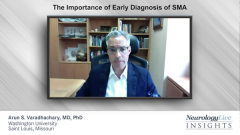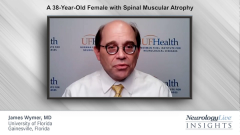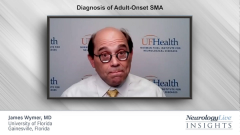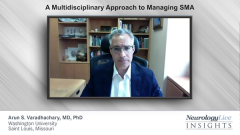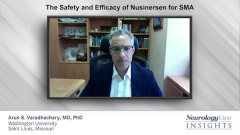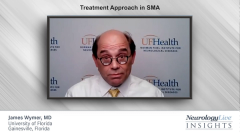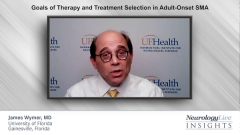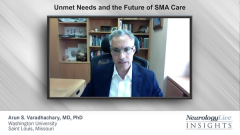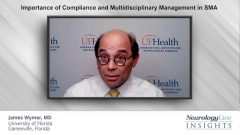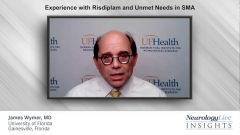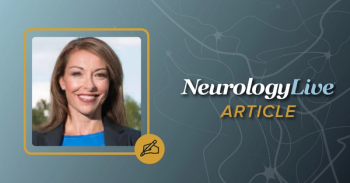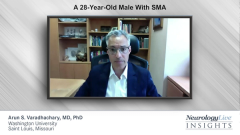
Unmet Needs and the Future of SMA Care
Arun S. Varadhachary, MD, PhD shares insights into clinicians’ and patients’ experiences with medical therapy, comments on unmet needs for adult patients, and speculates about the future of SMA care.
Episodes in this series

Arun S. Varadhachary, MD, PhD: My personal experience with Nusinersen has been positive, partially because it has changed the dynamic of conversations that I have with my patients. When patients recognize that there's a treatment available for their condition, it gives them a tremendous sense of empowerment and optimism for the future. Thus, when I can engage patients in a discussion about a treatment that might stabilize their function, and, if we're lucky, maybe even improve their function, that is very different than the kinds of conversations that we have had for many, many years prior. Consequently, instead of physicians somewhat dreading the experience of having a patient come to their clinic and having to tell them that there's nothing new to offer, the conversation now is, “Tell me what you can do now that you weren't able to do a year ago or 2 years ago.” Or, “How have things evolved, and how have things changed?” and have the patients be able to say, “You know, things are stable. Instead of me worrying about going downhill, now I feel that I can do things that I was able to do a couple years ago, and that hasn't changed. I'm happy with that.” That's what my experience has been with the medication. From the patients’ perspective, I think what they relate the most is the feeling that they are being taken care of in a way that they hadn't felt previously.
Now, they feel that there's a great deal of interest in their condition, and people are working hard to try to come up with better tools, better solutions, which gives them a great sense of optimism for the future and improves their overall sense of well-being. The advances over the last 5 years have been really tremendous. It's an exciting time to be a neuromuscular neurologist, not only with SMA treatments that are available. The technologies that are being unlocked will find applications in a whole host of other conditions. Although these technologies and therapies are a giant leap forward, our patients still have weakness, and that means that they're still going to be suffering from the long-term, chronic adverse effects of weakness. The unmet need for this population is to recognize that we still need to improve their strength. Being able to stabilize them may be good, but since many of them come to medical attention after they've already began to accumulate side effects and consequences of weakness, we still need help to try to improve their strength further.
We need to find ways to unwind some of the long-term negative consequences of chronic weakness. Many of our patients have weakness of their paraspinal muscles, which means that they have scoliosis and kyphosis. Many of these patients suffer from chronic backache [or] back pain as a consequence of that weakness. Many of them develop contractures, which reduces their overall range of motion. Thus, [we must find ways to] improve postural strength and range of motion and reduce the effect of contracture. These are areas [to which] we still have to pay a lot of attention. [We must recognize] that although we can stabilize their downward trajectory, and hopefully flatten that out now, we still have to work to try to improve function. It’s also important to recognize that it still requires a team approach to care for these patients. Despite the fact that we have treatments that are available, being able to optimize the outcome for these patients will require that all clinicians who interact with SMA patients work together to help [them] meet their maximum potential. It's been gratifying to recognize that the role of the neurologist has evolved so dramatically over a relatively short period of time. There used to be a time when the adage about neurology was, “Diagnosed, and Adios.” However, we now have a whole number of conditions for which we can play a role of real positive impact in these patients’ long-term care and trajectory. That's extremely satisfying and very gratifying for an individual clinician. Thus, the field of neurology is poised to make even greater inroads on a whole host of conditions, and SMA is just one example.
Transcript Edited for Clarity
Newsletter
Keep your finger on the pulse of neurology—subscribe to NeurologyLive for expert interviews, new data, and breakthrough treatment updates.

